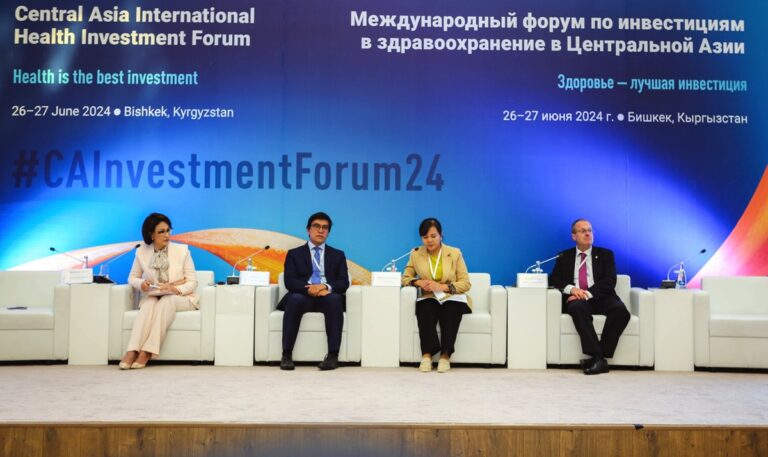Under the motto “Health is the Best Investment”, the first Central Asia International Health Investment Forum will bring together international, regional and national stakeholders to highlight the transformative potential of health investment for sustainable development in the five WHO Member States in Central Asia.
The two-day event, under the patronage of the President of Kyrgyzstan and organized by WHO/Europe and the Ministry of Health of Kyrgyzstan, aims to showcase best practices and innovative health investment strategies aligned with the Sustainable Development Goals (SDGs), such as public-private partnerships and digital health tools to improve efficiency.
Opening the forum, Dr Hans-Henri P. Kluge, WHO Regional Director for Europe, commented: “There is a reason why we are gathering today in the heart of Central Asia. While the rest of the WHO European Region is rapidly ageing, Central Asia has a young, educated population, about half of whom are under 30 years old. If the potential of young people is fully realized, Central Asia will have an advantage in the coming decades.”
Dr Kluge added: “Meanwhile, economic growth remains robust: gross domestic product is expected to grow by 4.1% this year, the highest of any region in the WHO European Region. These twin indicators – demographic and economic – give Central Asia a unique opportunity to accelerate its development, invest in key sectors, including health, and ultimately improve the lives of millions of people in this beautiful and diverse region.”
“Health is the greatest asset of every country, every family and every individual. Therefore, investing in health is the best investment,” said Kyrgyzstan’s Deputy Prime Minister Edil Baisarov. He stressed the need to strengthen regional cooperation in medical research and training programs, and called for the integration of modern technologies such as artificial intelligence and telemedicine.
Over the two days, Forum participants will explore progressive approaches to a range of issues, including strengthening access to primary health care, tackling tuberculosis and HIV/AIDS, mitigating climate change, improving emergency preparedness and addressing high rates of non-communicable diseases such as cardiovascular disease and cancer.
Central Asia, home to 76.5 million people, is experiencing an improvement in health outcomes: over the past two decades, life expectancy overall has increased by 5.2 years for men and four years for women, and maternal mortality has halved.
The region has taken decisive steps towards the SDGs, thanks to high-level political commitment by governments and significant investments in health and related sectors by a growing number of donors and the Central Asian countries themselves. But progress urgently needs to be accelerated, which will require significant support from key development partners and consistent commitment from governments and health stakeholders.
Central Asia’s promising economic growth of over 4% per year is currently more than double the European Union’s growth rate. The healthcare sector plays a key role in generating this growth. It is among the top 10 sectors of the regional economy, both as an employer and purchaser of goods and services. The healthcare sector stands to benefit more, as investments in healthcare have multiplier effects on the economy, social cohesion, environmental regeneration and human capital.
Since the adoption of the WHO/Europe Roadmap for Health and Well-being in Central Asia 2022-2025, Kazakhstan, Kyrgyzstan, Tajikistan, Turkmenistan and Uzbekistan have strengthened cooperation on health initiatives.
The roadmap outlines 11 areas of action, including strengthening primary health care, advancing the digital transformation of health care, improving financial protection, reducing the burden of infectious and non-communicable diseases, and creating a healthy and green environment.
The Forum aims to establish new partnerships and commitments, including with international donors and partners, to invest in health infrastructure and innovation to build a future in which health is the foundation of prosperity and stability in Central Asia.


